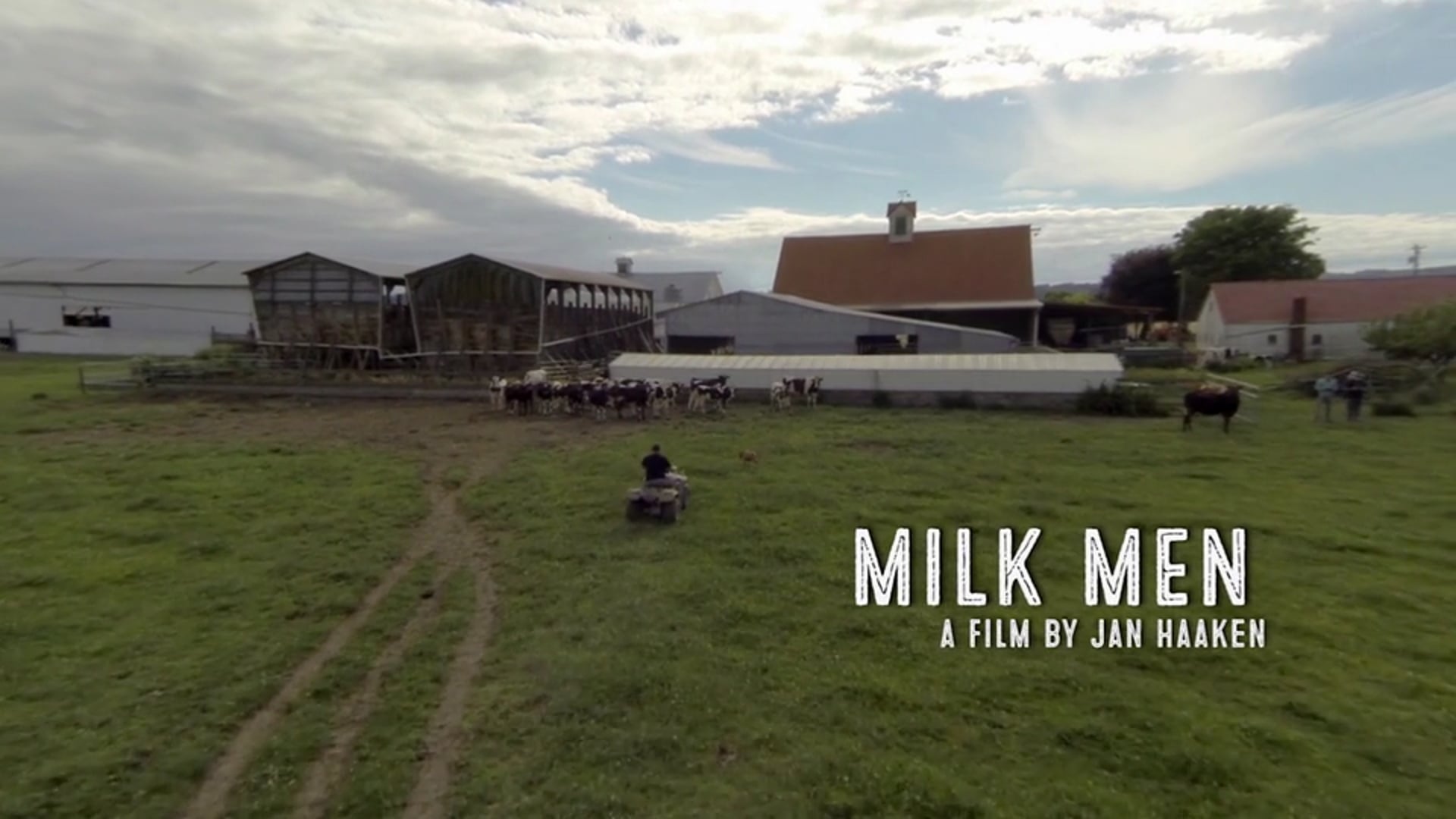Milk Men explores the dairy industry in the Pacific Northwest, following farmers through changing seasons in this scenic agricultural terrain. What emerges is a fascinating tale of modernity and pressures to grow-or-die.
Streaming Now
Watch Trailer
Background
MILK MEN provides a corrective to both the highly romanticized and demonized portraits of dairy farmers that circulate in the mainstream media. Two stereotypes predominate, and both are gross distortions of the reality. One image—enlisted routinely in dairy commercials—evokes idyllic pastoral scenes inhabited by simple people tending their contented cows. These scenes invite nostalgia for a pre-modern way of life where humans lived in perfect harmony with animals and nature. The second image—the one most often drawn by anti-dairy critics—casts the farmer as an animal abuser, pushing over-bred cows until they drop and producing large vats of drug-laden milk. Whether the cheery bucolic scene or the darkly cast world of the CAFO, both pictures miss the complexity of this form of work, with its mix of business skills, animal science, technology, engineering, and social networks required to keep the enterprise going.
Women involved in farming also are either stereotyped or invisible in mainstream films. Once associated with “milk maids,” the embodiment of wholesomeness and fecundity, dairy farming did become by the 19th century a primarily male occupation. Yet women continue to play important roles in agricultural production, whether as farmer’s wives and daughters equally involved in the dairy or, increasingly, as inspectors and scientists.
Whether in community theaters, schools or film festivals, documentary films are ideally suited for generating dialogue. MILK MEN challenges conventional stereotypes of farming communities, and establishes through the language of film areas of common ground between urban and rural communities. From inter-generational obligations to ethical dilemmas in farming practices, the film brings the historical knowledge of farmers into social questions at the very heart of modern life.
News & Reviews
“In the world of Milk Men, easy biases fall away as the backbreaking complexities of a way of life reveal themselves. Haaken is a skilled and honest documentarian, not tipping the scales but letting her subject speak for itself….”
Oregon Arts Watch
“The documentary Milk Men, by Jan Haaken, gently pulls aside the hazy curtain of romanticism that we have for our dairy farmers exposing the hard realities and decisions made by the people who provide this basic commodity. It is a sensitive examination of the choices people are making to maintain a viable dairy business: how to handle the push for expansion, can the farm be passed along to the next generation, and what is the role of women in the dairy industry…Milk Men is a thought provoking and nuanced look at our dairy farms and farmers.”
Judith Klinger
Founder and Director, World-Eats
“This documentary takes a no-holds-barred look at the dairy industry in northwestern Washington State. The viewer is taken on a sometimes dirty, sometimes beautiful, sometimes heartbreaking, always interesting journey from how things were to how they are. The external factors forcing most dairies to ‘go big or go bust’ are explained by producers in their own words. Their struggles, pride, decisions, frustrations and joys are honestly depicted in this well-rounded portrayal of modern dairy farming. The 99% of the U.S. population not directly involved with farming will come to understand that dairy producers are also mechanics, personnel managers, crop producers, financial planners, parents, neighbors, children and community leaders. ‘Milk Men’ is a visually stunning history lesson about an industry for which there is both nostalgia and conflict; misunderstanding and goodwill; tradition and change. It leaves the viewer pondering—and caring about—the answer to ‘Who will dairy in the future?’
Despite the fact that dairy producers often need to take out operating loans and assume more debt to continue to farm, like the producers featured in this film, most can’t imagine doing anything else for a living. First and foremost, they remain people who care about the quality of life for their animals, selves, family and community.”
Dr. Susan Kerr
Washington State University Northwest Regional Livestock and Dairy Extension Specialist
“Jan Haaken has taken on animal agriculture – specifically dairy farming – in this movie. She produced this movie for the “non-farming people” as one dairy farmer describes the rest of us. This is for everybody who knows that the little red barn and green pasture no longer represent modern farming but are searching for an honest insight into animal agriculture. MILK MEN addresses tough questions, from animal and labor welfare to the role of women in family farming. The film provides an honest insight into the tough lives that dairy farmers still live.
I thank Jan Haaken for respecting viewers’ intelligence by not trying to disguise the truth or attempting to influence the message through biased reporting. After watching this movie, I was left with an overwhelming feeling of fairness. Here is a snapshot into the families and companies that make up animal agriculture – it’s now up to the rest of us – the “non-farming-people” to watch and make up our mind if we feel reassured as we reach for the next piece of cheese. As an educator, this is exactly the type of movie that I appreciate and will use in my classes. It respects the intelligence of my students and provides an honest insight into animal agriculture.”
Lisbeth Goddick, Ph.D.
Food Science & Technology, Oregon State University
“Milk Men provides a refreshingly balanced and nuanced perspective on our complex relationship with dairy agriculture. It is a wonderful film for classroom use because it goes beyond the black-and-white approach of so many films on farming and helps students to appreciate the “grey” areas. Most films about the dairy industry do not reflect the realities of dairy farming, further contributing to the growing gap between consumers and those involved with animal agriculture.
This film effectively shows how a variety of factors (economy of scale, environmental and market pressures, land prices, shortage of labor, and family farm succession) have contributed to the relatively rapid change in the way farmers milk cows in the Pacific Northwest. While these changes may not be consistent with the public’s romantic view of small-scale dairy farms, the film accurately shows that those of us involved in the dairy industry still have a desire to take care of cattle and farm workers while providing a quality product.”
Mike Paros, DVM
Large Animal Veterinarian, Faculty, The Evergreen State College
Materials for Educators
-
Haaken, J. (June, 2016). FETA (Farmers for the Ethical Treatment of Animals) Meets PETA. Progressive Dairyman. (PDF version)
-
Haaken, J. (March, 2016). Milk and manure: Dairy farmers as social psychologists. Progressive Dairyman. (PDF version)









